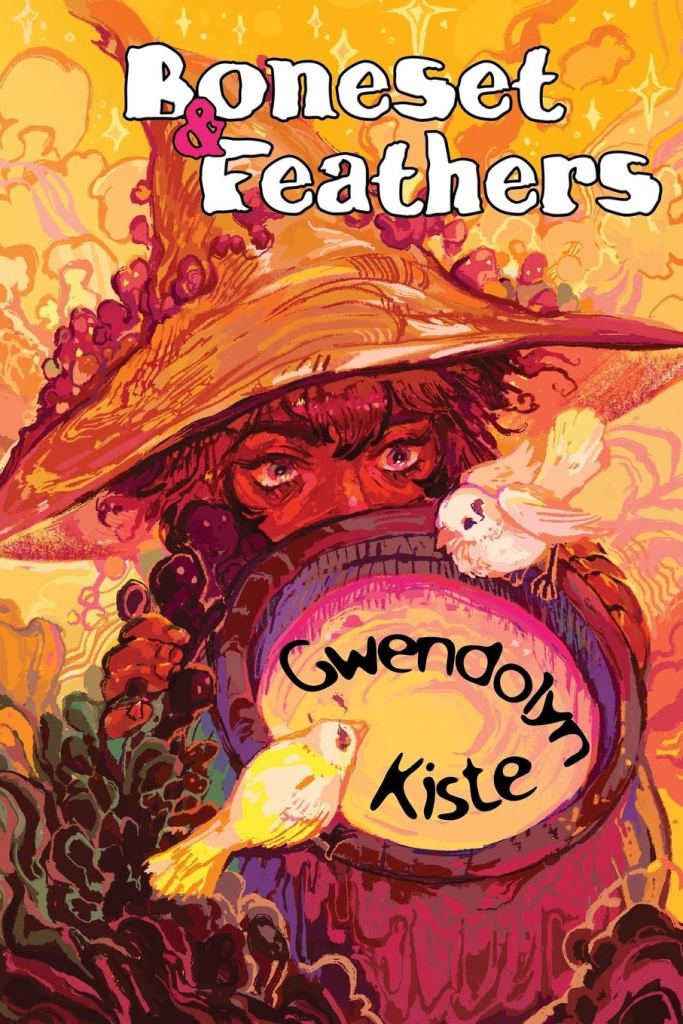
Boneset and Feathers Review
by Christina Ladd
Look: it may take a little while. It may not happen all at once. But Gwendolyn Kiste is going to be one of the brightest stars in the horror firmament. She’s already on her way, and Boneset and Feathers is yet more proof.
The first line is electric: “When the first crows fall from the sky, the villagers know I’m to blame.” It tells you almost everything you need to know, and most of the rest comes rushing after. Odette is our entry into a claustrophobic world of witches and witch-hunters, a nameless country that seems to have no greater authority than the witchfinder doyen, and no greater sin than magic. No reason for this hatred of magic is given, which I find rather compelling; after all, no reason can ever truly suffice. It’s all just an excuse. Odette is a witch—the last witch, she fears, and certainly the last witch in her village. The other villagers hate and fear her, and so she tries to stay away and keep herself from practicing even the simplest of charms. But nature always outs in the end, and Odette finds herself sublimating her magic via madness even as yet another witchfinder comes sniffing around her home, looking to finish the job with a final pyre.
This is intensely felt novel, with characters perpetually on the edge of breakdown and more than a little mad already. Its action is desperate and breathless, its triumphs always snatched from the jaws of defeat at the very last moment. But even though the action and emotion feel very instinct-driven, the plot turns out to be very tight indeed. Every seam is stitched up by the end of the brief 160 pages.
The only place where it could have used a tweak or two was in the flow of information. We don’t have a firm sense of the extent of Odette’s powers, or any witch’s powers, for that matter. All we know is that every single bird has gone from the area, and then reappeared dead, falling from the sky. That’s epic levels of power, godly, and yet Odette is filled with paralyzing terror at all times. We likewise do not hear of any other witches mounting a defense against the Witchfinders, begging the question of why.
There are reasons—good ones—that have to do with the divisive power of fear and the highly gendered unwillingness of men to act on “women’s issues.” Further, it’s somewhat of a character choice, since Odette herself doesn’t fully understand the extent of her powers. I have no quibbles with the levels of power on display or the uncertainty —if anything, it’s more realistic to think that human magic ebbs and flows like individual human emotions or energy levels. My only real issue with the book is that we don’t have great context for what is or isn’t possible until quite a bit further into the book, around chapter five, and even then it’s not entirely complete.
We need the context, too, to empathize most fully with Odette. When we do get more information about her past, the book goes from good to great, from compelling to engrossing. And scary, of course.
Several of the deaths in Boneset and Feathers felt like pointed critiques of the Disney-esque (or for others, the video game-esque) tendency to have villains turn to dust so that no one has to cope with a corpse. But there’s a different kind of horror in that, the decidedly unnatural act of a body falling apart in fast forward, everything substantial reduced in a matter of minutes rather than years. Human beings dissolving or disintegrating was actually a big fear I had as a kid, and Kiste plays with it quite wonderfully (or horribly—same thing). It becomes disturbing rather than reassuring to see someone vanish so utterly from the world.
Given the importance of graves to this book, I don’t think that’s an accident. To have a grave is to have a second chance at justice, to reach up one last objection in the form of a tombstone. But death isn’t presented as a straight shot to revenge. So often in horror, the dead are either antithetical to the living or aligned perfectly with them, only ever enemies or allies (or both, but in strict succession). Kiste uses the dead to ask whether such a strict dichotomy is necessary, when after all, the dead were people once. Complicated people, with whom the living did and still have complicated relationships.
Odette’s interactions with the dead are ultimately as satisfying and rich as her interactions with the living, both of which fortunately evolve from strict avoidance to nuance and warmth. Boneset and Feathers is another paean to the power and endurance of female friendship and sisterhood both literal and metaphorical, reminding me in all the best ways of Kiste’s previous work, The Rust Maidens. Because as much as there is trauma, there is also a very stubborn conviction that people and institutions might be better, and that relentlessness pays off. It is not a book about goodness but a book about hope in goodness, and that hope, though frail, proves more than equal to the flames.
Christina Ladd is a writer, reviewer, and librarian who lives in Boston, MA. She will eventually die crushed under a pile of books, but until then she survives on a worrisome amount of tea and pizza. You can find her at @OLaddieGirl on twitter, or her work on Strange Horizons, Speculative North, The Dread Machine, The Nerd Daily, and more.
[…] Odette knows what it’s like to be othered, persecuted, treated like dirt. Boneset & Feathers has some haunting, beautiful lines that stick with you long after the last page. Read a full review of Boneset & Feathers here. […]
LikeLike